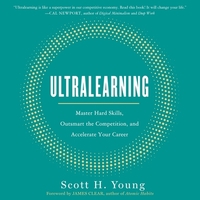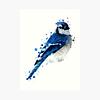You need to sign in or sign up before continuing.
Take a photo of a barcode or cover
231 reviews for:
Ultralearning: Master Hard Skills, Outsmart the Competition, and Accelerate Your Career
Scott H. Young
231 reviews for:
Ultralearning: Master Hard Skills, Outsmart the Competition, and Accelerate Your Career
Scott H. Young
This was really good and insightful. I think it was a mistake listening exclusively on audio though because this is the kind of book you need to annotate!!
Getting the physical copy ASAP because even though I don’t think I’ll be winning 5 back to back games of Jeopardy or learning 4 languages fluently in 1 year, there are some gems I think can help sort my mess of a brain out and help organise learning projects!
Getting the physical copy ASAP because even though I don’t think I’ll be winning 5 back to back games of Jeopardy or learning 4 languages fluently in 1 year, there are some gems I think can help sort my mess of a brain out and help organise learning projects!
I really enjoyed this book. The principles of learning are really helpful, aad the guide to implementing them is very useful.
Avoids the typical self-help pitfalls like trying to teach borderline sociopaths how to make friends with people or using magical thinking to become a millionaire. The book gives solid advice, but also makes it clear that learning is tough and takes massive amounts of hard work. Ultralearning seems like a good method once personalized to your own workflow and I'm sure I'll try a serious project soon.
Damn, Scott Young has gotten way better at learning since his last book. This one was well researched and sourced and compelling. It's a good companion to other more technical learning books like A Mind for Numbers.
In this book, Young presents his own "Ultralearning" techniques and philosophy having done extensive research into what makes people learn and how those people who have been exceptionally successful with their learning journeys and goals have achieved them. He also speaks from personal experience having undertaken ultralearning journeys in both academic and non-academic subjects himself.
I felt very energised and motivated until just under half way though the book and after that, the book began to feel repetitive and I began to realise that Young wasn't going to present me with any revolutionary learning techniques I had never thought of that could magically make me absorb and retain information.
I was fascinated by the stories and learning journeys of individuals included in the book including one man who decided to enter the world championships of public speaking after only starting his studies 10 days before the deadline to enter; and another who won the French Scrabble world tournament without actually speaking any French. However, the book could have been at least a quarter shorter and the content could have been presented in a sharper, more impactful way.
Rating: 3,5/5
I felt very energised and motivated until just under half way though the book and after that, the book began to feel repetitive and I began to realise that Young wasn't going to present me with any revolutionary learning techniques I had never thought of that could magically make me absorb and retain information.
I was fascinated by the stories and learning journeys of individuals included in the book including one man who decided to enter the world championships of public speaking after only starting his studies 10 days before the deadline to enter; and another who won the French Scrabble world tournament without actually speaking any French. However, the book could have been at least a quarter shorter and the content could have been presented in a sharper, more impactful way.
Rating: 3,5/5
informative
medium-paced
Nothing new here for anyone who’s had to get up to speed on a complicated topic (e.g., for work). Still, it’s always good to be reminded that impressive feats of self-directed learning are possible. The techniques offered are common-sense and available to anyone.
Although the book is strongest when explaining how an individual can jumpstart their studying, there are interesting tangents on our broader system of education. The discussion of the transfer problem was especially intriguing (aka why it’s so hard to apply classroom learning to new problems).
Definitely worth a borrow from the library, and check out the author’s blog for more tips, tricks, and stories.
informative
inspiring
reflective
fast-paced
I don't know why self-help books do this. If I'm reading your book, I don't need the first 20% of it to be reasons I should read the book!?!
Once you get past the fluff, I think this is a good entry-level book into some memory techniques and ways to learn more efficiently. As someone with a degree in Education, this book.... taught me nothing new.
It did have some interesting examples of people who have achieved extraordinary things using the book's techniques, but it also has some examples where the author goes, "This guy did this, but no one knows how. Anyway, this chapter is about x technique." It felt like his editor asked him to add an example for every chapter, so he came up with some random examples when he couldn't find relevant ones. So. Most of the book is fluff.
Er... so, if you dislike reading journal articles, I'd recommend reading this book because the author has read the journal articles and distilled them for you. But if you do have access to journal articles about education that you're willing to read, I'd just read those instead. This book isn't bad. It's just mostly fluff and inefficient. (For a book about efficiently and quickly educating yourself, this makes me chuckle a bit)
Once you get past the fluff, I think this is a good entry-level book into some memory techniques and ways to learn more efficiently. As someone with a degree in Education, this book.... taught me nothing new.
It did have some interesting examples of people who have achieved extraordinary things using the book's techniques, but it also has some examples where the author goes, "This guy did this, but no one knows how. Anyway, this chapter is about x technique." It felt like his editor asked him to add an example for every chapter, so he came up with some random examples when he couldn't find relevant ones. So. Most of the book is fluff.
Er... so, if you dislike reading journal articles, I'd recommend reading this book because the author has read the journal articles and distilled them for you. But if you do have access to journal articles about education that you're willing to read, I'd just read those instead. This book isn't bad. It's just mostly fluff and inefficient. (For a book about efficiently and quickly educating yourself, this makes me chuckle a bit)
The genre of self-improvement/self-help is hit or miss for me, but there's always a few gems in the sand. Aside from Atomic Habits and Cal Newport's books, this will probably join the rarefied inner circle of useful and interesting ones. The ideas were not necessarily new - but I'd say it is because these are things I personally have already done in my life of learning that I did not have names for. Optimization, learning and studying smarter, learning how to learn, a bit of obsessive zeal, clear deadlines, etc. These are all tactics I've used whether it's studying something as a personal goal or a professional one (such as a certification.) I wouldn't mind reading this again. There's some repetition, typical of this type of book, and it could be made leaner. But to be fair, I've encountered a lot of people in life that have trouble learning how to learn - and it IS a real skill.
3.75
I read this as I started self-studying for a big exam. I found a lot of the principles to be very insightful and helped me to rethink my approach to studying. That said, I think the book was a little long, and I would have preferred a bit more about the science of learning and less real-life examples.
I read this as I started self-studying for a big exam. I found a lot of the principles to be very insightful and helped me to rethink my approach to studying. That said, I think the book was a little long, and I would have preferred a bit more about the science of learning and less real-life examples.




